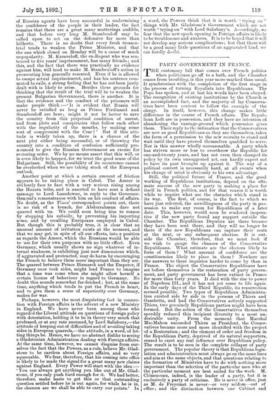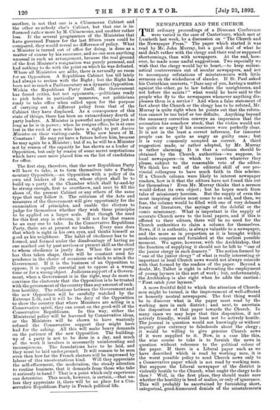PARTY GOVERNMENT IN FRANCE. T HE customary lull that comes over
French politics when politicians go off to a bath, and the Chamber ceases from troubling, is this year more marked than usual. It synchronises with the completion of the first stage in the process of turning Royalists into Republicans. The Pope has spoken, and at last his words have been obeyed. The recognition of existing institutions by the Church is an accomplished fact, and the majority of lay Conserva- tives have been content to follow the example of the clergy. In itself, however, this change makes little difference in the course of French affairs. The Repub- lican Left are in possession, and they have no intention of abandoning the vantage-ground which possession gives them. Their reply to the intimation that the Conservatives are now as good Republicans as they are themselves, takes the form of a permission to the new recruits to stand and wait until they have proved themselves qualified to serve. Nor is this answer wholly unreasonable. A party which has striven more or less to overthrow the Republic for one-and-twenty years, and has not even then changed its policy by its own unsuggested act, can hardly expect not to have its past brought up against it. The way of a. political convert is necessarily hard, at all events when his change of mind is obviously to his own advantage. Still, the political future of France, and the good working of Republican institutions, depend on the ulti- mate success of the new party in making a place for itself in French politics, and for that reason it is worth while to inquire what are the obstacles which stand in its way. The first, of course, is the fact to which we have just referred, the unwillingness of the party in pos- session to make any room for Republicans of a later date. This, however, would soon be rendered inopera- tive if the new party found any support outside the Chamber. The Republican Deputies are there because they have been sent there, and they will no longer be there if the new Republicans can capture their seats at the next, or any subsequent election. It is out- side the Chamber, therefore, that we must look if we wish to gauge the chances of the Conservative Republicans. What estimate are the electors likely to form of them ? What amount of confidence are the constituencies likely to place in them ? Nowhere are the answers to these inquiries harder to come by than in France. The object the Conservative Republicans have set before themselves is the restoration of party govern- ment, and party government has been extinct in France for more than forty years. It died with the rise to power of Napoleon III., and it has not yet come to life again. In the early days of the Third Republic, its resurrection seemed possible. Two types of Republican Administra- tion existed side by side in the persons of Thiers and Gambetta, and had the Conservatives actively supported Thiers, two genuinely Republican parties might have been formed. But the action of the Conservatives themselves speedily reduced this incipient diversity to a most un- desirable unity. From the moment that Marshal MacMahon succeeded Thiers as President, the Conser- vatives became more and more identified with the project of a Restoration ; and the element of order and freedom in the Republican Party, deprived of its natural supporters, ceased to exert any real influence over Republican policy. The result is to be seen in the complete collapse of party government. The popular theory is that Republican legis- lation and administration must always go on the same lines and aim at the same objects, and that questions relating to the formation of Ministries have to do with nothing more important than the selection of the particular men who at the particular moment are best suited for the work. M. ChSmenceau, indeed, is the leader of a party, but it is exclusively a party of criticism. He is never in office, just as M. de Freycinet is never—or very seldom—out of office; and the distinction between one Cabinet and another, is not that one is a Cl6menceau Cabinet and the other somebody else's Cabinet, but that one is in- fluenced rather more by M. Cl6nienceau, and another rather less. If the several programmes of the Ministries that have governed France for the last fifteen years could be compared, they would reveal no difference of policy. What a Minister is turned out of office for doing, is done as a matter of course by his successor, and no one sees anything unusual in such an arrangement, because the real ground of the first Minister's resignation was purely personal, and had nothing to do with the point on which he was defeated. Where all Ministries are alike, there is naturally no room for an Opposition. A Republican Cabinet has till lately had always to reckon with the Right ; but the Right has been not so much a Parliamentary as a dynastic Opposition. Within the Republican Party itself, the Government has found critics, but not opponents,—politicians ready to pick holes in particular measures, not politicians ready to take office when called upon for the purpose of carrying out a different policy from that of the Cabinet they have displaced. As a consequence of this state of things, there has been an extraordinary dearth of party leaders. A Minister is powerful and popular just so long as he is in power ; when he resigns office, he is at once lost in the ruck of men who have a right to put Ancien Ministre on their visiting-cards. Who now hears of M. Constans ? He may yet have a future before him, because he may again be a Minister ; but if so, he will be a Minister not by reason of the capacity he has shown as a leader of Opposition, but only by reason of some secret negotiations which have once more placed him on the list of candidates for office.
The first step, therefore, that the new Republican Party will have to take, is to form themselves into a Parlia- mentary Opposition,—an Opposition with a policy of its own and leaders of its own, whose object shall be to build up a party in the Chamber which shall by-and-by be strong enough, first to overthrow, and next to fill the shoes of, the present Cabinet or any others of the same type that may follow it. The criticism of the Acts and measures of the Government will give opportunity for the enunciation of principles, and enable the electors to judge for themselves whether they wish these principles to be applied on a larger scale. But though the need for this first step is obvious, it will not for that reason be an easy one to take. In the Conservative Republican Party, there are at present no leaders. Every man does that which is right in his own eyes, and thinks himself as good as his neighbour. The habit of obedience has to be formed, and formed under the disadvantage of having no one marked out by past services or present skill as the chief to whom obedience is justly due. When the new party has thus taken shape, there will be constant need for prudence in the choice of occasions on which to attack the Government. If it is the business of an Opposition to oppose, it is equally essential not to oppose at a wrong time or for a wrong object. Judicious support of a Govern- ment, when a Government is in the right, may do more to convince the electorate that the Opposition is to be trusted with the government of the country than any amount of reck- less hostility. The relations between the Government and the new Opposition will be carefully watched by the Extreme Left, and it will be the duty of the Opposition to show the country that where Ministers are acting in a Conservative spirit, they can count on the good-will of the Conservative Republicans. In this way, either the Ministerial policy will be leavened by Conservative ideas, or the Ministers will be shown to have wantonly refused the Conservative support they might have bad for the asking. All this will make heavy demands on the patience of the new Opposition. The building- np of a party is not to be done in a day, and much of the work it involves is necessarily uninteresting and inconspicuous. The foundations have to be laid, and they must be laid underground. It will remain to be seen even then how far the French electors will be impressed by labour of this unostentatious kind. Will they appreciate the self-effacement, the moderation, the steady attention to routine business, that it demands from those who take it seriously in hand ? That is a point which only experience can determine. This much, however, is certain,—that un- less they appreciate it, there will be no place for a Con- servative Republican Party in French political life.



































 Previous page
Previous page